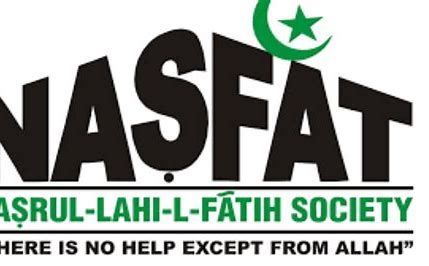Beyond Prayer: With Millions of Members and Global Reach, NASFAT Transforms Religious Zeal into Economic and Social Impact Across Continents.
July 2025 – While faith-based organizations worldwide grapple with dwindling influence and skepticism, a Nigerian Islamic movement is quietly rewriting the playbook, demonstrating how religious conviction can drive tangible real-world progress.
The Nasrul-Lahi-l-Fatih Society, widely known as NASFAT, isn’t your typical devotional group. What began in 1995 from a modest Lagos living room has mushroomed into a formidable pan-African Islamic force. Today, it boasts over 350 branches spanning Africa, Europe, and North America, underpinned by a sprawling network of schools, clinics, and economic empowerment initiatives. But NASFAT’s most revolutionary aspect isn’t its impressive scale; it’s its audacious strategy: leveraging Islamic da’wah—the propagation of Islam—as a powerful engine for socioeconomic transformation.
Faith in Action: A 21st-Century Da’wah Bluepint
A new paper, “Narrowing Gaps in Islamic Propagation: NASFAT’s Educational and Socioeconomic Strategies,” by Imam Onike Morufu Abdul-Azeez, NASFAT’s Chief Missioner and a scholar at Universiti Sains Malaysia, offers a rare, granular look into how this religious organization seamlessly blends scriptural adherence with modern development methodologies.
The research highlights NASFAT’s flagship “Train-the-Trainers” Da’wah program, which has empowered 5,665 participants over the past decade. Developed in collaboration with Nigeria’s Islamic Education Trust, the curriculum is surprisingly broad, encompassing Qur’anic literacy, interfaith dialogue, and even modules designed to counter Orientalist critiques and clarify gender misconceptions within Islam.
The outcome? A rapidly expanding cadre of articulate, intellectually grounded Muslim professionals, confidently equipped to both defend and advance their faith. From Mosque to Marketplace: Powering the Mission with Institutions NASFAT’s achievements extend well beyond the spiritual realm. Over the last decade, the organization has meticulously constructed a parallel ecosystem of faith-based institutions driving advancements in education, healthcare, media, and commerce. A snapshot of their impact:
I) Fountain University, Osun State: A NASFAT-owned Islamic university, it’s a significant contributor to Nigeria’s graduate pool.
II) NAZAS (Zakat and Sadaqat Agency): Since 2014, it has disbursed over ₦700 million in charitable support, targeting the needy.
III) Kiin Media: An Islamic media powerhouse, now broadcasting across radio, TV, and holding a terrestrial license.
IV) TAFSAN Travels and Investments: A major player in Hajj logistics and the distribution of merchandise, demonstrating commercial acumen.
V) NASFAT Health Initiative: Operates five functioning healthcare centers with two more actively under construction, extending vital health services.
VI) NASLAC (NASFAT Legal Aid Council): A pro bono legal clinic staffed by volunteers, providing crucial legal assistance.
VII) Havek Leadership Academy: Focused on nurturing future Islamic leaders with practical, real-world skills.
In essence, NASFAT has effectively institutionalized da’wah, evolving it into a robust delivery
mechanism for public good.
Scaling Learning: Da’wah Embraces the Digital Age
Even amid the global pandemic, NASFAT’s momentum was unyielding. The organization swiftly pivoted, launching:
I) NASFAT Online Qur’an and Fiqh Institute: Bridging gaps for adults previously unable to read the Qur’an.
II) Tahfiz Schools: Both physical and virtual, dedicated to Qur’anic memorization.
III) Certification Programs through NBAIS: Facilitating the transition of Arabic scholars into formal academic pathways.
This strategic expansion dramatically boosts access to Islamic education in a nation where literacy, particularly in religious studies, remains a challenge in many communities.
Partners in Progress: NASFAT’s Global Network
NASFAT’s influence extends into international development circles, forged through active collaborations with:
- UNICEF & UN Women: Partnering on critical violence prevention campaigns.
- Discover Islam (Bahrain): Engaged in joint Da’wah initiatives.
- Carter Center (Senegal): Collaborating on community well-being training.
- Roxbourg Institute (Switzerland): Providing MBA scholarships specifically for Imams.
- The Alternative Bank: Supporting Muslim entrepreneurs with microfinance solutions.
- WARIF and the European Union: Driving impactful gender-based violence programs.
This dynamic fusion of faith and multilateral engagement is both rare and highly effective.
The Numbers Speak: Skyrocketing Da’wah Participation
The data unequivocally illustrates a surging demand for NASFAT’s programs. Participation in its annual Da’wah training surged from a mere 73 individuals in 2012 to an astounding 1,435 in 2024—a nearly 20-fold increase in just 12 years. The program’s curriculum consistently earns accolades for its rigor and contemporary relevance.
Sample Modules Include:
I) Misconceptions about Islam and Muslims
II) Gender in Islam: Theological vs. Cultural Realities
III) Ethics of disagreement in the Qur’an
IV) Islamic views on justice, jihad, and mercy
V) Strategies for peaceful dialogue with non-Muslims
The approach is distinctly academic yet highly accessible, designed to cultivate what NASFAT proudly terms “Muslims by Choice, not by Chance.”
The Gen Z Question: Navigating Future Challenges
Despite its successes, challenges loom. As the global economy tightens and Gen Z increasingly distances itself from traditional religious institutions, NASFAT confronts familiar hurdles of identity and retention. Its trajectory into the next chapter will hinge on sustained digital innovation, compelling youth programming, and deeper, more integrated community engagement.
A Model for Faith-Driven Development
What NASFAT unequivocally demonstrates—as underscored by Abdul-Azeez’s study—is that religion need not be a relic of the past. When thoughtfully structured, driven by a clear mission, and open to strategic partnerships, faith can indeed serve as a powerful catalyst for inclusion, literacy, dignity, and peace.
From pro bono legal aid desks in Lagos to intensive Qur’an memorization circles in Canada, NASFAT’s model suggests that the future of Islam in Africa may not lie in fiery rhetoric or political posturing, but rather in the quiet, impactful work unfolding within community centers, classrooms, and clinics.
